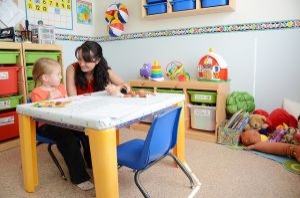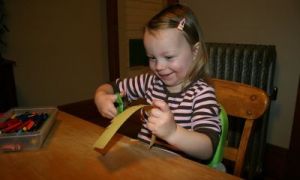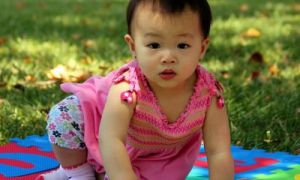Traineeships in early childhood settings in Australia offer a fantastic opportunity to gain practical experience while earning a qualification. The following article provides information on the Types Of Traineeships Available, Cert 3 Traineeship, Diploma Traineeship, Benefits Of A Traineeship, What To Expect and more.
Types Of Traineeships Available
-
Certificate III in Early Childhood Education and Care:
-
This is a common starting point for those entering the early childhood education field. It combines on-the-job training with formal education.
-
-
Diploma of Early Childhood Education and Care:
-
For those looking to advance their careers, this diploma offers more in-depth training and can lead to higher-level positions within early childhood settings.
-
Many organizations offer pathways from Certificate III to Diploma, allowing for continuous professional development.
-
-
Certificate III in Outside School Hours Care:
-
This qualification is tailored for those interested in working with children in before and after school care settings.
-
-
Certificate IV in Business:
-
While not specific to early childhood education, this qualification can be beneficial for those looking to move into administrative or managerial roles within early childhood settings.
-
-
Certificate IV in Leadership and Management:
-
This qualification is ideal for those aspiring to leadership roles, providing skills in team management, communication, and strategic planning.
-
These traineeships provide a valuable combination of practical experience and formal education, helping you to build a rewarding career in early childhood education.
Certificate III in Early Childhood Education and Care Traineeship
A Certificate III in Early Childhood Education and Care Traineeship is a fantastic way to start a career in early childhood education. Here’s an overview of what you can expect:
Course Overview
-
Qualification: Certificate III in Early Childhood Education and Care (CHC30121)
-
Duration: Typically takes about 12 to 24 months to complete.
-
Study Mode: Combination of on-the-job training and formal study, which can be online or in a classroom setting.
-
Requirements: Must be employed as a trainee in a regulated early learning centre for a minimum of 13 hours a week.
What You Will Learn
-
Child Development: Understanding the developmental stages of children from birth to 5 years old.
-
Health and Safety: Implementing health, safety, and wellbeing practices.
-
Educational Frameworks: Applying the Early Years Learning Framework (EYLF) and other approved learning frameworks.
-
Practical Skills: Providing care, creating educational activities, and supporting children's learning and development.
-
Communication: Developing positive and respectful relationships with children, families, and colleagues.
Career Opportunities
-
Roles: Childhood Educator Assistant, Outside School Hours Care Aide, Preschool Assistant, Nanny, Recreation Assistant.
-
Pathways: This qualification can lead to further study, such as a Diploma of Early Childhood Education and Care, which can open up more advanced career opportunities.
Benefits of a Traineeship
-
Earn While You Learn: Traineeships are paid positions, allowing you to earn an income while gaining valuable skills and qualifications.
-
Hands-On Experience: Gain practical experience in a real-world setting, applying what you learn in your coursework.
-
Mentorship: Receive guidance and support from experienced educators.
-
Nationally Recognized Qualification: Upon completion, you will receive a nationally recognized qualification that can enhance your career prospects.
Getting Started
-
Research Providers: Look for reputable training providers that offer this traineeship.
-
Check Eligibility: Ensure you meet the minimum age and educational requirements, and have the right to work in Australia.
-
Apply: Prepare your resume and cover letter, and apply to multiple traineeship programs.
-
Enroll: Once accepted, complete the necessary enrollment paperwork and attend orientation sessions.
-
Begin Training: Start your practical training and engage in your coursework.
By completing a Certificate III in Early Childhood Education and Care Traineeship, you'll be well-equipped to start a rewarding career in early childhood education.
Diploma of Early Childhood Education and Care Traineeship
Course Overview
-
Qualification: Diploma of Early Childhood Education and Care (CHC50121)
-
Duration: Typically takes about 18 to 24 months to complete.
-
Study Mode: Combination of on-the-job training and formal study, which can be online or in a classroom setting.
-
Requirements: Must be employed as a trainee in a regulated early learning centre for a minimum of 13 hours a week.
What You Will Learn
-
Advanced Child Development: Deepen your understanding of the developmental stages of children from birth to 5 years old.
-
Health and Safety: Implement advanced health, safety, and wellbeing practices.
-
Curriculum Development: Design, implement, and evaluate educational programs that align with the Early Years Learning Framework (EYLF) and other approved learning frameworks.
-
Leadership Skills: Develop leadership and management skills to supervise staff and volunteers.
-
Family and Community Engagement: Learn strategies to effectively engage with families and the community to support children's learning and development.
Career Opportunities
-
Roles: Early Childhood Educator, Room Leader, Educational Leader, Centre Director, Family Day Care Coordinator.
-
Pathways: This qualification can lead to further study, such as a Bachelor of Early Childhood Education, which can open up more advanced career opportunities.
Benefits of a Traineeship
-
Earn While You Learn: Traineeships are paid positions, allowing you to earn an income while gaining valuable skills and qualifications.
-
Hands-On Experience: Gain practical experience in a real-world setting, applying what you learn in your coursework.
-
Mentorship: Receive guidance and support from experienced educators.
-
Nationally Recognized Qualification: Upon completion, you will receive a nationally recognized qualification that can enhance your career prospects.
Getting Started
-
Research Providers: Look for reputable training providers that offer this traineeship.
-
Check Eligibility: Ensure you meet the minimum age and educational requirements and have the right to work in Australia.
-
Apply: Prepare your resume and cover letter and apply to multiple traineeship programs.
-
Enroll: Once accepted, complete the necessary enrollment paperwork and attend orientation sessions.
-
Begin Training: Start your practical training and engage in your coursework.
By completing a Diploma of Early Childhood Education and Care Traineeship, you'll be well-equipped to take on leadership roles in early childhood education.
Duration Of A Traineeship
The duration of a traineeship in early childhood settings in Australia typically varies depending on the qualification being pursued and the individual's pace of learning. Here are some general timeframes:
-
Certificate III in Early Childhood Education and Care:
-
Usually takes about 12 to 24 months to complete.
-
-
Diploma of Early Childhood Education and Care:
-
Typically takes around 18 to 24 months to complete.
-
-
Certificate III in Outside School Hours Care:
-
Generally takes about 12 to 18 months to complete.
-
These timeframes can vary based on factors such as the training provider, the structure of the program, and whether the traineeship is being completed on a full-time or part-time basis.
Benefits Of A Traineeship
Traineeships offer numerous benefits, especially in early childhood settings. Here are some key advantages:
-
Practical Experience: Traineeships provide hands-on experience in a real-world setting, allowing you to apply theoretical knowledge practically.
-
Earn While You Learn: Traineeships are paid positions, so you can earn an income while gaining valuable skills and qualifications.
-
Mentorship: Trainees often receive guidance and support from experienced professionals, helping them develop their skills and confidence.
-
Career Pathways: Completing a traineeship can open doors to further education and career advancement opportunities within the early childhood sector.
-
Industry Recognition: Traineeships are recognized by employers and can enhance your resume, making you more competitive in the job market.
-
Skill Development: Traineeships help you develop a wide range of skills, including communication, teamwork, and problem-solving, which are essential in any career.
-
Networking: Working in a professional environment allows you to build a network of contacts that can be beneficial for future career opportunities.
-
Qualification: Upon completion, you receive a nationally recognized qualification, such as a Certificate III or Diploma in Early Childhood Education and Care.
-
Job Security: Many traineeships lead to permanent employment opportunities, providing job security and stability.
-
Personal Growth: Traineeships can boost your confidence, independence, and sense of achievement as you progress through your training and career.
These benefits make traineeships an excellent pathway for those looking to start or advance their careers in early childhood education.
What To Expect During A Traineeship
Embarking on a traineeship in early childhood settings in Australia is an exciting journey. Here's what you can expect:
1. Structured Learning
-
Combination of Work and Study: You'll split your time between practical, hands-on experience in a childcare setting and formal study, either online or in a classroom.
-
Guidance and Support: Expect to receive mentorship from experienced educators who will guide you through your learning journey.
2. Practical Experience
-
Real-World Application: You'll apply the theoretical knowledge you gain in real-world scenarios, working directly with children and participating in daily activities.
-
Skill Development: Develop essential skills such as communication, teamwork, and problem-solving.
3. Professional Growth
-
Career Pathways: Completing a traineeship can open doors to further education and career advancement within the early childhood sector.
-
Networking: Build a network of contacts within the industry, which can be beneficial for future career opportunities.
4. Earning While Learning
-
Paid Position: Traineeships are paid positions, so you'll earn an income while gaining valuable skills and qualifications.
-
Financial Support: Some traineeships may offer additional financial support or incentives.
5. Qualification
-
Nationally Recognized: Upon completion, you'll receive a nationally recognized qualification, such as a Certificate III or Diploma in Early Childhood Education and Care.
-
Pathway to Further Education: This qualification can serve as a stepping stone to higher education and specialized roles within the field.
6. Supportive Environment
-
Mentorship: Benefit from the guidance of experienced professionals who are invested in your success.
-
Professional Development: Access to ongoing training and development opportunities to enhance your skills and knowledge.
7. Personal Growth
-
Confidence Building: Gain confidence as you develop new skills and take on responsibilities.
-
Sense of Achievement: Experience the satisfaction of contributing to the development and well-being of young children.
8. Regulatory Compliance
-
Understanding Regulations: Learn about the regulations and standards that govern early childhood education in Australia.
-
Compliance Training: Receive training on how to ensure compliance with these regulations in your daily work.
By participating in a traineeship, you'll gain a comprehensive understanding of early childhood education, develop practical skills, and build a strong foundation for a rewarding career.
How To Get Started
Getting started with a traineeship in early childhood settings in Australia involves several steps. Here’s a guide to help you begin your journey:
1. Research and Choose a Traineeship
-
Identify Your Interests: Determine which area of early childhood education you are most interested in, such as general childcare, outside school hours care, or leadership roles.
-
Research Providers: Look for reputable training providers and organizations that offer traineeships.
2. Check Eligibility Requirements
-
Age and Education: Ensure you meet the minimum age and educational requirements for the traineeship. Typically, you need to have completed Year 10 or equivalent.
-
Work Rights: Verify that you have the right to work in Australia, as traineeships are paid positions.
3. Apply for the Traineeship
-
Prepare Your Resume: Highlight any relevant experience, skills, and qualifications.
-
Write a Cover Letter: Explain why you are interested in the traineeship and how it aligns with your career goals.
-
Submit Applications: Apply to multiple traineeship programs to increase your chances of acceptance.
4. Attend Interviews
-
Prepare for Interviews: Research common interview questions and practice your responses. Be ready to discuss your interest in early childhood education and your career aspirations.
-
Dress Professionally: Make a good impression by dressing appropriately for the interview.
5. Enroll in the Traineeship Program
-
Complete Enrollment Paperwork: Once accepted, complete any necessary enrollment forms and provide required documentation.
-
Attend Orientation: Participate in orientation sessions to learn about the program, expectations, and your role.
6. Begin Your Traineeship
-
Start Working: Begin your practical training in an early childhood setting. Apply the knowledge you gain from your coursework to real-world scenarios.
-
Engage in Learning: Attend classes, complete assignments, and actively participate in training sessions.
7. Seek Support and Mentorship
-
Find a Mentor: Connect with experienced educators who can provide guidance and support throughout your traineeship.
-
Ask Questions: Don’t hesitate to ask questions and seek help when needed.
8. Complete Your Traineeship
-
Fulfill Requirements: Ensure you meet all the requirements of the traineeship, including practical hours and coursework.
-
Receive Your Qualification: Upon successful completion, you will receive a nationally recognized qualification, such as a Certificate III or Diploma in Early Childhood Education and Care.
9. Explore Career Opportunities
-
Apply for Jobs: Use your new qualification and experience to apply for positions in early childhood education.
-
Continue Learning: Consider further education and professional development opportunities to advance your career.
By following these steps, you can successfully start and complete a traineeship in early childhood settings in Australia, paving the way for a rewarding career in early childhood education.
Further Reading
Childcare Traineeship Wages and Conditions
Starting A Traineeship In Childcare
7 Types Of Traineeships Available For New And Existing Educators
Preparing For An Interview
Resolving Problems While Working As A Trainee In A Service
References:
Traineeships 2024, Talent Australia
Traineeships Definition, Indeed Australia







 Whether you are doing a Cert 3 or a Diploma traineeship or thinking about doing a traineeship it’s a good idea to understand what wages
Whether you are doing a Cert 3 or a Diploma traineeship or thinking about doing a traineeship it’s a good idea to understand what wages Work placement is an excellent opportunity for you to prepare and gain insight into the early childhood industry as well as help you to clarify
Work placement is an excellent opportunity for you to prepare and gain insight into the early childhood industry as well as help you to clarify Are you thinking of starting a traineeship in childcare? Well from personal experience, working in this child care industry brings great fulfilment and satisfaction. Watching
Are you thinking of starting a traineeship in childcare? Well from personal experience, working in this child care industry brings great fulfilment and satisfaction. Watching There is no truth to the rumour that the certificate III or 'actively working towards' will be phased out.
There is no truth to the rumour that the certificate III or 'actively working towards' will be phased out.
 For educators looking to update their qualification and have the required knowledge, experience and skills instead of completing assignments and tasks to complete a qualification
For educators looking to update their qualification and have the required knowledge, experience and skills instead of completing assignments and tasks to complete a qualification As a student finding information and doing research is an important part of completing assignments. Once you find the information you need to complete the
As a student finding information and doing research is an important part of completing assignments. Once you find the information you need to complete the Being a student and completing assessments can be a hard task. Especially when you don’t understand what the question is, you have to write an
Being a student and completing assessments can be a hard task. Especially when you don’t understand what the question is, you have to write an Hiring overseas educators can not only bring a service the benefits of a diverse, multicultural workplace but also address staffing shortage issues. However before an
Hiring overseas educators can not only bring a service the benefits of a diverse, multicultural workplace but also address staffing shortage issues. However before an As you take the next big step and decide to continue studying you need to decide whether you will be able to manage working at
As you take the next big step and decide to continue studying you need to decide whether you will be able to manage working at Making the decision to study is a big one. It can be stressful, thinking of how you're going to complete assignments or if you're going
Making the decision to study is a big one. It can be stressful, thinking of how you're going to complete assignments or if you're going


